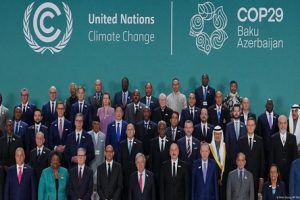
Climate change is undoubtedly the defining challenge of the 21st century. While the world wars of the previous century significantly shaped the geopolitical landscape, the effects of global warming will likely have an even more profound and far-reaching impact on human civilization as a whole. However, as the planet continues to warm at an alarming rate, the consequences of a changing climate are poised to reshape the global landscape in profound and unprecedented ways, with consequences that, in many cases, may be even more severe and widespread than the ravages of war.
At the most fundamental level, climate change threatens the basic requirements for human life and flourishing. Disruptions to food and water security, driven by rising temperatures, shifting precipitation patterns, and increasingly frequent extreme weather events, put hundreds of millions at risk of malnutrition. Arable land is turning to desert, harvests are failing, and clean freshwater sources are being contaminated or depleted. The resulting humanitarian crises could dwarf even the largest armed conflicts in terms of human suffering.
Climate change is also fueling the emergence and spread of deadly infectious diseases. Also, mass displacement driven by climate disasters is already straining the capacity of nations to provide humanitarian aid, while heightening geopolitical tensions and the risk of armed conflict over dwindling resources. The systemic nature of these challenges raises the prospect of civilizational collapse as multiple interlinked systems that sustain human societies come under unprecedented strain.
In the face of pressing global environmental challenges, Ethiopia has emerged as a beacon of hope with its visionary Green Legacy Initiative. This Green Legacy Initiative lays a profound understanding of the intricate relationship between a healthy, thriving ecosystem and the well-being of the nation’s people. Ethiopia has a rich agricultural heritage, has grappled with the consequences of rapid population growth, unsustainable farming practices, and the relentless exploitation of natural resources. The result has been a steady decline in forest cover, soil fertility, and overall environmental resilience.
The impetus for the Green Legacy Initiative is Ethiopia’s severe deforestation and environmental degradation challenges. Over the past several decades, the country has lost a significant portion of its forest cover due to factors like agricultural expansion, livestock grazing, and the unsustainable harvesting of wood resources. This has had devastating impacts on Ethiopia’s biodiversity, soil fertility, water resources, and climate.
Through the Green Legacy Initiative, the Ethiopian government aims to reverse this trend and restore the country’s natural landscapes. The program has mobilized the entire nation, from the federal government to regional state officials to communities, schools, and businesses, to participate in the massive tree-planting effort. Through coordinated campaigns and community-driven initiatives, Ethiopians from all walks of life have enthusiastically embraced the challenge, with the goal of restoring the country’s ecological balance and securing a sustainable future.
Ethiopia has made remarkable strides in environmental conservation and climate change mitigation. According to Kebede Yamam, the Director General of Ethiopia’s Forest Development, the country’s forest lands alone have stored an astounding 2.8 billion tons of carbon.
Kebede stated that Ethiopia has been able to reduce 30% of the 35 billion tons of carbon polluting the world through its forest conservation efforts. This achievement can be largely attributed to the country’s Green Legacy initiative, a program that is making substantial contributions to environmental recovery and air pollution prevention.
As part of the Green Legacy program, it aims to plant an ambitious 50 billion tree saplings over the next eight years. Among these, in the past five years, more than 32.5 billion saplings have already been planted under the initiative, and plans are in place to plant an additional 18 billion saplings in the remaining three years.
Moreover, the Green Legacy Initiative extends beyond the act of planting trees. It encompasses a broader vision of sustainable development, which includes the promotion of agro-forestry practices, the protection of water resources, and the integration of renewable energy solutions. By addressing these interconnected aspects of environmental sustainability, the initiative aims to create a self-sustaining cycle of ecological restoration and economic prosperity.
The benefits of these tree-planting efforts extend beyond carbon sequestration. He highlighted that the program has also enabled the production of various fruit and cash crop seedlings, contributing to the country’s food security. Moreover, the research on how Ethiopia has planted seedlings over the past years, climate protection, and economic impacts of the planted seedlings will be announced next month, promising to have far-reaching implications.
He emphasized that Ethiopia’s environmental protection work will not only benefit the country but also contribute to stabilizing peace in the East African region by alleviating poverty to prevent floods, droughts, and unemployment. He stressed the importance of making environmental protection accessible to all areas, preventing land degradation, and guiding the efforts with knowledge and policy.
Beyond the tangible environmental benefits, the Green Legacy Initiative has also served as a powerful icon of Ethiopia’s determination to lead the way in addressing the climate crisis. By positioning itself as a global leader in reforestation, it serves as a model for other countries looking to combat climate change and sustainable development. The country has gained international recognition which strengthened its diplomatic ties with other nations committed to environmental stewardship.
As the world grapples with the urgent need to address the devastating effects of climate change and environmental degradation, the Ethiopian Green Legacy Initiative stands as a shining example of what can be achieved through bold, ambitious, and collaborative action.
Ethiopia has launched a major reforestation initiative, donating millions of tree saplings to its neighboring countries, including Djibouti, Kenya, and South Sudan. This collaborative effort aims to combat deforestation and promote sustainable environmental practices across the region, he noted.
Through its innovative approach and unwavering commitment, Ethiopia is not only transforming its own landscape but also inspiring a global movement towards a greener, more sustainable future for all.
The Director General of the Federal Environmental Protection Authority, Engineer Lelise Nemie, also stated that the commitment activities of a country’s society have a prodigious role in environmental conservation. She mentioned that World Environment Day is celebrated on May 27th and 28th, 2016, with the theme of “land restoration, desertification, and drought resilience.”
She mentioned that World Environment Day is being celebrated for the 51st time globally and the 31st time in Ethiopia, highlighting the significance of a clean and green environment for human well-being. This celebration spirit involves various activities, such as caring for previously planted saplings, cleaning campaigns, and awareness-raising occasions.
She emphasized that environmental protection is not the responsibility of a single institution but rather a collective effort involving all segments of society. She called for a joint approach to address environmental issues. Like water, soil, and plastic pollution, underscoring the need for collaboration and a unified commitment to safeguarding the planet.
Ethiopia’s impressive environmental initiatives, including the Green Legacy programs, demonstrate the country’s unwavering dedication to tackling climate change and promoting sustainable development. These efforts not only benefit the nation but also have the potential to inspire and influence the global community in the fight for a greener and more resilient future.
BY FIKADU BELAY
THE ETHIOPIAN HERALD WEDNESDAY 5 JUNE 2024





